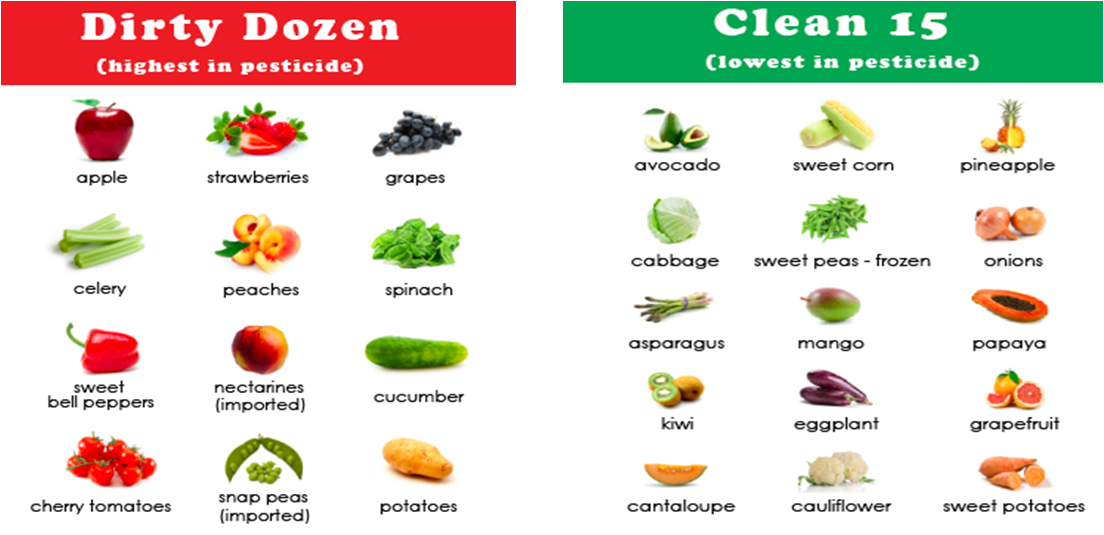By Major Anita Caldwell
Dear Waco,
Over the past twenty-seven years as a Salvation Army Officer, I have learned the many journeys of those in poverty. There are those who seek lasting change in their lives. There are those who manipulate with great skill. This blog is written to consider the pan handler. There are generally three or four types:
The desperate pan handler is that person who is desperate for alcohol or drugs. My first experience was in El Dorado, Arkansas, on a cold Christmas Eve with a drunken man, his sign and his little dog, Joshie. When we got him to the local hospital, he had $300 in his pockets. In that small, Christian community everyone was giving him money. He then took it a few steps to a nearby wine store, purchased his drink of choice, slept under a nearby tree and returned the next day to the same corner.
The professional pan handler is that person who is skilled to the point that he or she can make as much as $300 or $400 per day. This person will use any and all types of “crutches.” Locally, we have a man who pan-handles using a wheel chair. At the end of the day, he wheels to his vehicle, stands up, folds up his wheelchair, gets into his car and drives home.
The syndicate pan handler gathers a group of people and uses them to collect money. These people are much like traffickers because they only give their pan handlers food and shelter but gather the remaining income for their own purpose. In Moscow, Russia, where we lived for six years, pamphlets were placed in all expat locations such as clinics with a clear warning to not give to any person begging because they were all part of a crime syndicate. They would place an elderly person in the metro and pick her up at the end of the day, take her money and continue the same routine day after day. These organized groups are here in Waco as well.
Finally, only on very rare occasions, will there be a truly needy person asking for money. However, they generally go to the many social service locations in town and seek the help needed.
Pan handlers prey on giving people. They will find a giving community and gather in that giving city. Waco is a Christian community with Christian people traveling here to visit our fair city. The pan handler has the best of both worlds in Waco: new people and giving, caring people.
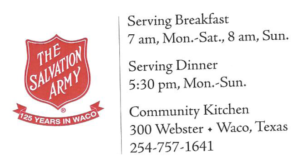 The Salvation Army has developed a small card you can give to the pan handler so they can have a free meal and you can be guilt free. We don’t fear that too many people will come; the pan handler typically wants money, not food, not gas for their car. Please send them to one of the many local agencies who can help them. Our commitment is to build a relationship with those who are willing to overcome their needs and to seek how we can best support their pathway to hope.
The Salvation Army has developed a small card you can give to the pan handler so they can have a free meal and you can be guilt free. We don’t fear that too many people will come; the pan handler typically wants money, not food, not gas for their car. Please send them to one of the many local agencies who can help them. Our commitment is to build a relationship with those who are willing to overcome their needs and to seek how we can best support their pathway to hope.
Should God speak to you and ask you to give, follow His guidance and give, but please do not give purely out of guilt. Such guilt does not guarantee that you will assist a genuine need.
May God bless you and bless those in need.
Major Anita Caldwell
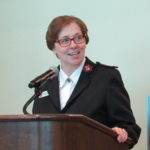 Major Anita Caldwell was born in Olean, NY, to a family of ministers. She attended and graduated from Kentucky Mountain Bible Institute with a BA in Religion. Her MA is in Pastoral Leadership from Olivet Nazarene University. She and her husband, Bradley Caldwell are Majors in The Salvation Army and are Regional Coordinators for this area. They have served as ministers of the gospel in The Salvation Army for 23 years. After serving in three USA appointments, they were transferred as Regional Leaders in Moldova, Romania, Russia and the country of Georgia over a twelve-year period. They received their Waco assignment after serving at International Headquarters in London, UK.
Major Anita Caldwell was born in Olean, NY, to a family of ministers. She attended and graduated from Kentucky Mountain Bible Institute with a BA in Religion. Her MA is in Pastoral Leadership from Olivet Nazarene University. She and her husband, Bradley Caldwell are Majors in The Salvation Army and are Regional Coordinators for this area. They have served as ministers of the gospel in The Salvation Army for 23 years. After serving in three USA appointments, they were transferred as Regional Leaders in Moldova, Romania, Russia and the country of Georgia over a twelve-year period. They received their Waco assignment after serving at International Headquarters in London, UK.
The Act Locally Waco blog publishes posts with a connection to these aspirations for Waco. If you are interested in writing for the Act Locally Waco Blog, please email [email protected] for more information.
By Craig Nash
I had to learn a new lingo when beginning my work at the Texas Hunger Initiative, and it was challenging. (The very use of the word “challenging” in the previous sentence is an example, and proof that I have begun to absorb the lingo, choosing a more tame term over a collection of other, more colorful, words that I would have chosen before.) And it wasn’t just the acronyms connected to social services that were, uh, challenging. It was a whole new lexicon full of words meant to convey how we are doing our work, but words that are usually used with different meaning outside the non-profity world in which we exist. Words and phrases like “value-add,” “capacity,” and, my personal favorite, “bandwidth,” would often leave me looking around the room wondering if I am the only other person suffering from a mental condition that prohibits me from understanding. I eventually picked up the pace and figured the new language out, although I am still much slower at translation that most of my colleagues.
One word, though, that resonated with me early on is the term “access,” often used when describing how easy or difficult it is for a particular person or group to receive basic human needs. In other fields of conversation we may say that someone can or can’t afford a particular need, or someone is or isn’t able to provide for themselves or their families. But access opens up a different line of thought altogether. It guides us into a more compassionate mode of thinking for those without it, as well as for those who have it. It equals the playing field, if you will.
With regards to access to food, there are a number of reasons someone may or may not have it. Money is one, but so is availability, location and safety. I’ve witnessed an army of people in our city whose very job and mission is to make access more widespread.
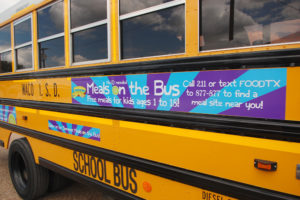 One way that Waco and La Vega ISD’s Child Nutrition departments have been making access to food more widespread to our local children is through their mobile meal-bus programs. If location is a barrier (there’s another one) to access, then they are working to remove that barrier. Rather than requiring children to come to one of the dozens of stationary Summer Food sites around town, they are bringing Summer Food sites to neighborhoods, parks and clinics all around the area. Like the other sites, food on the buses are free to children under 18, and require no id to, um, access.
One way that Waco and La Vega ISD’s Child Nutrition departments have been making access to food more widespread to our local children is through their mobile meal-bus programs. If location is a barrier (there’s another one) to access, then they are working to remove that barrier. Rather than requiring children to come to one of the dozens of stationary Summer Food sites around town, they are bringing Summer Food sites to neighborhoods, parks and clinics all around the area. Like the other sites, food on the buses are free to children under 18, and require no id to, um, access.
One way you can help increase access is to spread the word. All summer sites can be found by visiting Summerfood.org. Below is a list of Waco and La Vega ISD Meals on the Bus location stops and times.
Waco ISD “Meals on the Bus” – Monday through Friday
Bus #1
Waco Apartments, 2724 Robinson Drive 10:40-11:00am
South 18th Street Community Center, 1800 Gurley Lane 11:10-11:30am
Elm Street Community Center, 609 Elm 11:45am-12:05pm
Waco Central Library, 1717 Austin Avenue 12:20-12:40
UBC, 1701 Dutton Avenue 12:50-1:10
East Waco Library 1:25-1:45
Bus #2
Scott & White Macarthur Center, 2201 Macarthur Dr. 10:40-11:00am
Family Health Center, 1000 Delano Street 11:15-11:35
Barron’s Branch Apartments, 819 Colcord 11:45am-12:05pm
Estella Maxey Apartments, 1000 Delano 12:15-12:35
Guthrie Park, 7400 Brookview Drive 12:50-1:10
La Vega ISD “Lunch Bus Express” – Monday through Thursday
JMJ Wrecking, Corner of Campground Road and Harrison St. 10:10-10:30am
Maranatha Church, Ashleman and Latimer Streets 10:40-11:00am
La Vega High School Tennis Courts 11:10-11:30
Brazos Village Apartments, Lakeshore and Gholson Rd. 11:40am-12:20pm
Brame Park, Hogan St. and Briarwood 12:30-1:10
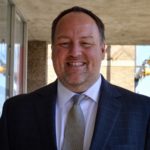 Craig Nash has lived in Waco since 2000. Since then he has worked at Baylor, been a seminary student, managed a hotel restaurant, been the “Barnes and Noble guy,” pastored a church and once again works for Baylor through the Texas Hunger Initiative. He lives with his dog Jane, religiously re-watches the same 4 series on Netflix over and over again, and considers himself an amateur country music historian.
Craig Nash has lived in Waco since 2000. Since then he has worked at Baylor, been a seminary student, managed a hotel restaurant, been the “Barnes and Noble guy,” pastored a church and once again works for Baylor through the Texas Hunger Initiative. He lives with his dog Jane, religiously re-watches the same 4 series on Netflix over and over again, and considers himself an amateur country music historian.
The Act Locally Waco blog publishes posts with a connection to these aspirations for Waco. If you are interested in writing for the Act Locally Waco Blog, please email [email protected] for more information.
Dear Friend:
Welcome to Waco!
The boundless summer skies in Central Texas are filled with the savory smoke of family cookouts, the lazy tunes of summer concerts and care-free laughter from parks and summer pools.
Summer is also a time of transition.
As you unpack your bags, I pack mine.
Waco is my home of three years and I will greatly miss it as I leave to serve as the chief fundraiser at a Habitat for Humanity branch in my hometown in Maryland after serving in that role here at Waco Habitat. With some difficulty, as I will explain later, I draft this letter as a means to provide orientation to you and a farewell to our community.
Keep Those Sleeves Rolled Up – Waco Needs your Talents
You have moved, made your first trip to Waco Habitat for Humanity ReStore, found some great paint to redecorate a room or two and you probably made your first trip to a magical grocery store that holds everything your heart, soul and stomach could ever desire in three initials: H.E.B.
You may wonder about your first steps towards getting involved in your new community. Well, you made the right step in reading Act Locally Waco.
Three years ago, I met the founder of Act Locally Waco (ALW), Ashley Bean Thornton, who created the site initially as a “one stop shop” for nonprofits, businesses and individuals to post upcoming events, and job opportunities. ALW is now a critical communication tool in our community.
Ashley and I met at Common Grounds. Three unexpected things happened during the meeting: 1) I noticed and respected Ashley’s incredibly red converse shoes that brilliantly matched her joyful spirit, laugh and intelligence, 2) I placed a random order for a coffee drink called, “Pig Swig”, a decision that forever changed the course of this coffee drinker’s life for the better and 3) Ashley invited me to write about housing issues and how national policy impacts affordable housing here in Waco; a natural fit for someone who works at Habitat for Humanity. I did not know that this invitation would make me the first blogger of what is now a series of talented, well-respected Wacoans who serve as peer-bloggers about diverse issues that range from food, health, fitness, racial issues, education and many topics in-between.
Three years later, it is mighty difficult to find a meaningful way to say goodbye to a community that has meant so much to me between 500-1000, non-rambling (non-sappy) worded blog post.
Sure enough, before I knew it, I realized I was writing around emotions and not truly writing about the true impact our community had on me…it was easier to write about my favorite coffee spots (Common Grounds as mentioned before, Dichotomy is also highly ranked in my heart) and provide a survey of their must-eat menus than to share the heart of the matter. In the spirit of embracing vulnerability (Brené Brown), I rephrased this letter to do just that.
I am a better person because I called Waco home.
I edited this letter several times to unbury the questions: “what about Waco made me feel at home…what about Waco made me want to dig deeper and work harder for our community?”.
The soulful, truth-seeking expedition started above my keyboard and made me feel like a paleontologist at our Waco Mammoth National Park…the “day to day” of three years, commutes on Franklin Ave and I-35, hours of meetings, errands to H.E.B., and highs and lows we all have in life needed to be brushed aside so I could see that truth.
That truth is that Waco’s strong communities of worship and the outstanding service opportunities & associations of our town made the three years a rich, life-giving experience.
Communities of Worship
There are nearly 365 houses of worship in the Greater Waco area based on one recent survey conducted by a local nonprofit. I was able to call Calvary Baptist Church, Acts Church and later Antioch Community Church my spiritual homes during my time here.
Each church was stuffed with timely friendships and messages of encouragement that were sorely needed and allowed for opportunities for me to give back as well. Antioch’s life group network is among the best communities of faith I have been part of and I’m thankful to have the good problem of scheduling more goodbye visits with brothers and sister than there are hours in the day.
You may have the good problem of sorting through which house of worship is a best fit. If you are to be a long-term member or have a membership that reflects mine, know that no matter where you land, you will find a great spiritual home.
Service Opportunities & Associations
For each community of faith I encountered, I found that the mission to put the Gospel into action was highly encouraged and space was provided in service to share about upcoming volunteer or giving opportunities.
Likewise, I’ve had friends who were not part of any community of faith but also cared deeply about Waco and their friendships had an equally powerful influence on my personal growth.
Often times, I would meet diverse people from different professional, ethnic, racial and cultural backgrounds as we discussed positive ways to build our community. We all seemed to share the courage to push the status quo while we also shared mutual respect for each other.
The following nonprofits and civic groups provided space for that personal growth (learn more by clicking on the service opportunity):
- Caritas – Caritas provides the vital service of food and nutrition in addition to other services to our community. Contact them to learn how to volunteer, donate financially or learn about what items are most needed in the food bank ministry.
- Waco Community Development Corporation – Community engagement and affordable housing are some of the focus areas for Waco CDC. Contact them to learn about their homebuyer education courses and learn how to donate to their mission. Their Executive Director, Mike Stone, is going on Mike’s Hike during this summer to raise funds for much needed home repairs in Waco. Call their office to learn how to support this work.
- Citizens for Responsible Lending – A grassroots group focused on the healthy alternatives towards payday lending. Contact Alexis Christensen at Waco Community Development to learn more (see above link).
- CASA (Court Appointed Special Advocates) of McLennan & Hill Counties – CASA stands in the gap for children in the foster care system as CASA staff and volunteers serve as the child’s advocate. Contact them to learn about how to become a CASA volunteer or how to give to their incredible mission.
- Waco Habitat for Humanity – Habitat brings people together to build homes, communities and hope. Habitat builds affordable new homes, repairs existing homes and operates ReStore. Contact the Habitat team to learn how to donate, volunteer or to hear about our latest inventory at ReStore.
- Association of Fundraising Professionals – Professional mentorships, trainings and online resources provided by AFP empowers regional fundraisers to excel through ethical fundraising practices (annual membership in June is discounted $50, contact chapter admin Susan Duecy at [email protected] for more info).
- Prosper Waco – An effort designed to look at education, health and financial security and how our community can move along a collective impact, data-driven model towards each category. Contact them to learn how to join committee work.
- LeadershipPlenty – Leadership training for Wacoans at no cost, LeadershipPlenty is made of facilitators from the community who teach a proven curriculum. Local leaders graduate and apply lessons learned to deepen their existing leadership roles in the community. Contact Catherine Bauer at [email protected] to learn about the application process.
- Nonprofit Networking Hours – Sponsored by the Cooper Foundation, these trainings in management best practices also allow space for news and local events to be shared. Click on the “Nonprofit Networking Hours” link to learn about past and upcoming events.
- Board Trainings – The Waco Foundation annually holds board trainings so that local organizations are well-equipped to lead their mission-work responsibly. Contact Nicole Wynter at n[email protected] to learn more
- City of Waco Council Meetings – Held at the Waco Convention Center on the 1st and 3rd Tuesdays of every month. The hearing of the visitors officers a time where you as a citizen can speak for about 3 minutes about any topic and City staff follow up with you about your concerns. This is a great way to have your voice heard.
- Chambers of Commerce: Hewitt, Waco, Central Texas African American, and Hispanic chambers offer social hours, networking events; Waco’s Young Professionals host professional trainings.
Do Not Wait to Unpack
Living in Waco is not a spectator’s sport.
You can engage the above partnerships or match your skillset to others (by no means is the above list comprehensive of all the partnerships in Waco).
Some common themes run throughout the on-going work of many Waco-based organizations. The above partnerships deal with ongoing issues such as affordable housing, racial disparities in our community and poverty that cannot be addressed alone as it takes your participation, time and resources to make a difference.
I have lived in four states and several different communities and I have never before witnessed any other community like Waco where effective collaboration makes such a positive impact.
We have achieved a great deal together and can still do much more. Further progress greatly relies on open access to the discussion on how to make Waco a place we can all call home.
Using ALW to first learn about said issues and then to later participate in events is a realistic progression towards engagement.
Don’t wait to unpack your skills – jump right on in; Waco will embrace you as you embrace Waco.
What are perceived social or economic challenges are tremendous opportunities for partnership and growth.
No matter how long you may call Waco home, you will be changed for the better and our community will greatly benefit from the gifts you are willing to unpack, share, and develop with your new community.
All the best.
Phil York
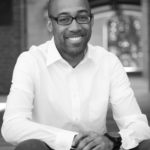 For the last three years Phil York has been working at Waco Habitat for Humanity, most recently as Director of Development. A self-described “policy nerd;” he has also been the Act Locally Waco housing and homelessness policy blogger. Now he is moving back to his home state of Maryland. We’ll miss you, Phil! Thank you for diving into Waco! We are better off for your having been with us for a while!
For the last three years Phil York has been working at Waco Habitat for Humanity, most recently as Director of Development. A self-described “policy nerd;” he has also been the Act Locally Waco housing and homelessness policy blogger. Now he is moving back to his home state of Maryland. We’ll miss you, Phil! Thank you for diving into Waco! We are better off for your having been with us for a while!
The Act Locally Waco blog publishes posts with a connection to these aspirations for Waco. If you are interested in writing for the Act Locally Waco Blog, please email [email protected] for more information.
By Glenn Robinson
Did you know the city of Waco has one of the highest teen pregnancy rates, pre-term deliveries, infant mortality rates, and child abuse in the state of Texas? What if there was a way to change these results in a way that benefits not only the mother and child, but also our community and population health overall?
Together with the Waco Foundation, we at Baylor Scott & White Medical Center – Hillcrest have launched a program called Nurse-Family Partnership committed to producing enduring improvements in the health and well-being of low-income, first-time parents and their children. Implemented in January 2016, the program is designed to utilize bachelor-prepared RN’s to deliver into a home environment the information, education, and resource connection for the success of the mother’s pregnancy and the child’s overall health at birth. This evidence-based model has been successfully breaking the generational poverty cycle in counties all over America for the past 38 years, including 33 counties within Texas.
This proven model allows care providers to improve birth and health outcomes for first-time mothers and their babies by educating them in ways that increase attendance to appointments, thereby decreasing the likelihood of early delivery, unforeseen complications and follow-up ER visits.
But our commitment does not stop there – the program continues through the child’s second birthday. As part of the curriculum, in-home assessments are used to identify early childhood development concerns, and promote school readiness. Additionally, our team’s goal is to involve the family unit as a first source of learning, as well as provide nurturing and mentor support to the mother so she may become a more prepared and confident parent.
Hillcrest, in conjunction with community partners, recognizes the need for programs like this to help break the cycle of poverty for at-risk, teenage mothers in our community. Nurse-Family Partnership can help break this generational cycle – empowering confident mothers to become skillful parents who are able to prepare their children for successful futures, growing into healthy, productive citizens.
Interested in learning more about this terrific program? Contact us! Let’s work together for the good of our kids and our community!
Nurse-Family Partnership
Baylor Scott & White Hillcrest Medical Center
120 Hillcrest Medical Boulevard #303
Waco, Texas 76712
254-202-1130
Nfp.sw.org
Nursefamilypartnership.org
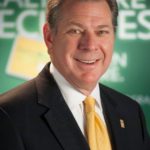 Glenn Robinson has been the President of Baylor Scott & White Medical Center – Hillcrest since September 2007. He previously held several CEO positions at hospitals in Texas, Oregon and South Carolina. A Georgia native and graduate of the University of Alabama, Glenn completed graduate school at Trinity University in San Antonio, Texas. He has more than 30 years experience in hospital and healthcare management, is a Fellow of the American College of Healthcare Executives, has received several professional awards and serves on a number of national and state healthcare policy boards. He also serves as an Adjunct Lecturer for both Baylor University and Trinity University and is involved in several non-profit organizations and community councils. Glenn and his wife, Rhonda, have three children: Josh, Jacob and Sarah Kathryn, and one grandchild: Pierce.
Glenn Robinson has been the President of Baylor Scott & White Medical Center – Hillcrest since September 2007. He previously held several CEO positions at hospitals in Texas, Oregon and South Carolina. A Georgia native and graduate of the University of Alabama, Glenn completed graduate school at Trinity University in San Antonio, Texas. He has more than 30 years experience in hospital and healthcare management, is a Fellow of the American College of Healthcare Executives, has received several professional awards and serves on a number of national and state healthcare policy boards. He also serves as an Adjunct Lecturer for both Baylor University and Trinity University and is involved in several non-profit organizations and community councils. Glenn and his wife, Rhonda, have three children: Josh, Jacob and Sarah Kathryn, and one grandchild: Pierce.
The Act Locally Waco blog publishes posts with a connection to these aspirations for Waco. If you are interested in writing for the Act Locally Waco Blog, please email [email protected] for more information.
by Louise Powell, Waco Founder Lions Club Vision Screening Chair
This summer, the Waco Founder Lions Club is pleased to announce our partnership with Allergan Foundation. Prevent Blindness Texas, other Waco area Lions Clubs, and the optometry practice of Dr. Robert Salganik to improve the vision of Central Texans. At the recent groundbreaking of Waco’s Allergan plant expansion, the Allergan Foundation gave the Waco Founder Lions Club a grant to provide 100 no-cost eye exams to Waco area people who don’t have the money or insurance to cover eye exams.
Why 100 exams? The Waco Founder Lions club celebrates its 100th birthday July 2016 (with a huge street party on July 15, 2015 at Lions Park), and Lions International will celebrate its 100th birthday in 2017. Allergan Foundation has chosen to honor the Centennial Anniversary of both the Waco Founder Lions Club and Lions International because, like Allergan, the Lions are dedicated to vision preservation. Since 1925, the Lions’ primary focus has been on vision-related projects. That year—1925–Helen Keller challenged Lions International to become “Knights for the Blind.” Through the years, Lions have recycled donated eye glasses, distributing the refurbished glasses to people all over the world. We have trained service dogs and provided Braille materials for the blind, operated eye banks for corneal transplants, combatted river blindness in Africa and Latin America, and conducted vision screenings in local communities.
Why are no-cost professional eye exams important? Many adults cannot afford eye exams for themselves or their children. Health insurance doesn’t always cover eye exams. Lots of folks don’t have separate vision insurance. And Medicare will not cover routine eye exams for glasses. Lions have discovered these facts as we travel about the community providing vision screenings. When our screenings with our fantastic new Spot Vision Screener reveal a vision problem, we advise clients to make an appointment with an eye care professional, but often they will tell us they can’t afford the exam. Now we can tell our friends that the Lions Club can help them—through the generosity of our partners.
Why is partnership important in preserving the sight of Wacoans? With the help of our partners, we have more people and more money dedicated to vision preservation in Central Texas. For years, optometrist Dr. Robert Salganik of Optical Dispensary has provided discounted eye exams for referrals from Waco Founder Lions Club, but our Waco Founders Lions Club budget was limited to about 50 eye exams a year. With Allergan’s grant, this year we can provide 100 more Wacoans no-cost exams. Another partner, the non-profit organization Prevent Blindness Texas, will continue to cooperate with Lions clubs in vision screenings and provide additional vouchers for no-cost eye exams and glasses for adults who qualify. In addtion, local area Lions Clubs cooperate in providing vision screenings to the community and referring people for eye exams.
What does a Vision Screening by Lions Club look like? You have to see it to believe it! The Waco Founder Lions Club has purchased a high tech vision screening camera that within seconds “takes a picture” which can identify the following serious eye conditions in a child or adult: nearsightedness, farsightedness, astigmatism, and pupil and gaze abnormalities. Results are printed automatically and given to the client; if a problem is detected, a printout (in red) advises “Complete Eye Exam Recommended.” In over 1600 screenings this past year, approximately 20% of the children and adults received a recommendation for an eye examination by an optometrist or ophthalmologist.
Why is this 20% important? Children from the age of 6 months to 5 years of age are often called the “underserved population” because parents do not realize the importance of a complete eye exam in these early years. In fact a child’s first eye exam should be at 9 months (according to the American Optometric Association and American Ophthalmological Association). Babies and young children don’t know they can’t see, so they don’t tell their parents that anything is wrong. Unfortunately, if a vision disorder such as “Lazy Eye” is not detected and corrected early, permanent vision loss can occur. Poor vision can also affect early learning and beginning reading efforts. Schools conduct annual screenings; however, many children unnecessarily suffer from poor vision for several years before they begin school. Vision disorders stand a chance of correction without surgery if detected at an early age.
If you are interested in scheduling a vision screening– which can be arranged for day cares, health fairs, churches, schools, recreation centers, or community festivals/events—call the Lions Club. Vision screening for the citizens of the Waco area is a service project of the Waco Founder Lions Club and other area Lions Clubs.
Contact Numbers: Louise Powell (409) 392-4671 or Waco Founder Lions Club Office (254) 776-5341 –office open Mon-Thurs. 9:00-1:00 –leave a message or e-mail [email protected]
You can find more information about Spot Vision Screening at this website: Spot Vision Videos.
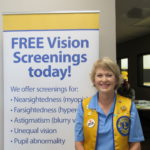 Louise Powell is currently an adjunct English instructor at Baylor and MCC. Previously she was an English teacher and administrator in Waco I.S.D. She is married, the mother of three grown children and grandmother to six (and one on the way). Louise is a past president of Waco Founder Lions Club and currently serves as Vision Screening Chair. Waco Founder Lions Club is the oldest continuously operating Lions Club in the world. We will be 100 years old this July 2016. To learn more about the Waco Founder Lions Club, be our guest any Wednesday at lunch, 12:00 at the Lions Den, 1716 N. 42nd St.
Louise Powell is currently an adjunct English instructor at Baylor and MCC. Previously she was an English teacher and administrator in Waco I.S.D. She is married, the mother of three grown children and grandmother to six (and one on the way). Louise is a past president of Waco Founder Lions Club and currently serves as Vision Screening Chair. Waco Founder Lions Club is the oldest continuously operating Lions Club in the world. We will be 100 years old this July 2016. To learn more about the Waco Founder Lions Club, be our guest any Wednesday at lunch, 12:00 at the Lions Den, 1716 N. 42nd St.
he Act Locally Waco blog publishes posts with a connection to these aspirations for Waco. If you are interested in writing for the Act Locally Waco Blog, please email [email protected] for more information.
by Destiny Fernandez
In 2009, I was a quiet, goofy, friendly sophomore at University High School. I was a soccer player, a JROTC cadet, a member of the color guard, a cheerleader, and an absolutely terrible softball player. I enjoyed my friendships, took care of business in academics, and intentionally surrounded myself with community. All the while, no one knew of my homelessness. I wasn’t trying to hide it from others so much as I was trying to hide it from myself. It was painful, frustrating, and discouraging if I thought about it for too long.
On the outside, I seemed to be doing great. On the inside, I wrestled with frustration as I coped with what was happening at home. One Saturday morning, officers entered my home and flipped everything upside down…my belongings, my life. We lost everything. My stepfather went to prison on drug-related charges, and from that point on, life for us was never stable. We moved often, with family members and friends. At times, my mother, brothers, and I were separated.
Although what happened was painful – and is difficult to remember, and difficult to share — I hope that it is a reminder to be patient and loving with people. It’s true that you never know the battles they are facing. Despite changing, unstable situations, I still went to school with a smile on my face (a little blue fish told me to “just keep swimming”). Most days, that smile was genuine; other days, that smile was there because it was better than answering anyone who would ask, “What’s wrong?” You might wonder how I managed to hold it together when life was falling apart. When I look back, I can’t believe it myself.
What I can say is that I was surrounded with people that cared for, loved, and encouraged me. Although in some ways I was broken, they didn’t treat me like I was. Through every encouraging word, breaking of bread together, and moment of laughter, they unknowingly helped me pick up the shattered pieces of my life. “Homeless” is a painful, stigmatizing, and shameful word to use to define yourself. However, I am willing to own it only to encourage. To encourage students like me to see that life can get better. To encourage others to see the impact that is made when a student is surrounded with support, love, and encouragement on their journey. Each of our students has individual gifts, talents, and goals that need to be nurtured and believed in. They should have no doubt that they are important. They are valued. They are loved. I am where I am today because others believed in me; they said I could, so I did.
Today I have two college degrees sitting on my bookshelf: a bachelor’s degree from Texas A&M University and a master’s degree from Baylor University. I haven’t taken them out of the tubes because they’re difficult to look at. When I look at them, I’m reminded that my story is sometimes considered an exception. It shouldn’t be. I don’t want it to be. In the state of Texas, and across the nation, the homeless youth graduation rate is 25%. In Waco ISD last year, 100% of homeless seniors graduated. That should attest to the incredible resiliency, strength, and ability of our students.
Every student, including those experiencing homelessness, has unique gifts, talents, interests, passions, goals, and dreams. They should feel cared for, valued, and empowered enough by those around them to relentlessly pursue those dreams. Someone in my life was crazy enough to tell me that I was called, equipped, chosen, set apart, loved, and that all I needed was a mustard seed of faith to move mountains. I am so thankful for each person in my path that prepared the soil, helped me to plant, water, fertilize, give sunlight to, and nurture that mustard seed.
So many people have heard my story and in retrospect have said, “I wish I knew then; I had no idea…I could’ve helped; I could have done something.” To which my response has been, “well, you can now.” You can do something to support and love on our youth experiencing homelessness in Waco by supporting The Cove. The Cove is a teen nurturing center designed to provide a safe space for student experiencing homeless to access the resources they need to thrive. It is an amazing place that will provide the care, opportunity, value, and empowerment that students like me need to walk in all that they were created to be. I urge you to support the Cove in any way that you can.
In order to open our doors to these deserving students this fall, we need to raise funds. The Cove has set a goal of $300,000 by December 2016. It is imperative for the well-being of our students and of our community. From the bottom of my heart, THANK YOU. To the countless people who helped change the trajectory of my life: THANK YOU. My life has not been the only one you’ve changed.
The Cove is a teen nurturing center designed to provide a safe space for student experiencing homeless to access the resources they need to thrive. The Cove’s mission is to empower and equip youth experiencing homelessness. The Cove is truly a community effort to care for some of the most vulnerable youth in Waco. There are lots of ways you can join us. Check out our Philanthropy and Volunteer pages for more information. To learn more, to get involved or to donate, please visit the website: www.thecovewaco.org.
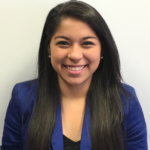 Destiny Fernandez is a Waco native. She graduated from Texas A&M in 2014 and recently received her Master of Social Work degree from Baylor. She is passionate about education reform and hopes to make a difference in Texas education. To connect with Destiny, email: [email protected]. To learn more about and/or donate to the Cove, visit: www.thecovewaco.org.
Destiny Fernandez is a Waco native. She graduated from Texas A&M in 2014 and recently received her Master of Social Work degree from Baylor. She is passionate about education reform and hopes to make a difference in Texas education. To connect with Destiny, email: [email protected]. To learn more about and/or donate to the Cove, visit: www.thecovewaco.org.
The Act Locally Waco blog publishes posts with a connection to these aspirations for Waco. If you are interested in writing for the Act Locally Waco Blog, please email [email protected] for more information.
by Joel H. Scott
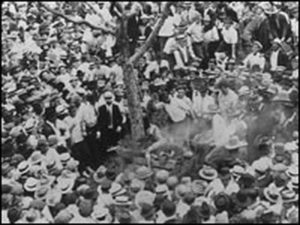 The Jesse Washington memorial service was a confluence of feelings for me. It was sobering, enlightening, liberating, divine… and it made me feel fragile. While I found myself wooed by the rhythmic interplay of words of lament and declarations of faith, (a faith that overcomes the longstanding shadows of hatred and egregious forms of violence), internally, I was struck by my feelings of fragility about my place at this service. I know I represent, both symbolically and historically, a form of unchecked dominance and power to underrepresented populations in this country. I’ve known this for a long time, but it is still uncomfortable for me. Rather than sit with my insecurity, I still prefer to focus on how much “progress” I’ve made in the past 15 years of work toward becoming a more “culturally competent educator.”
The Jesse Washington memorial service was a confluence of feelings for me. It was sobering, enlightening, liberating, divine… and it made me feel fragile. While I found myself wooed by the rhythmic interplay of words of lament and declarations of faith, (a faith that overcomes the longstanding shadows of hatred and egregious forms of violence), internally, I was struck by my feelings of fragility about my place at this service. I know I represent, both symbolically and historically, a form of unchecked dominance and power to underrepresented populations in this country. I’ve known this for a long time, but it is still uncomfortable for me. Rather than sit with my insecurity, I still prefer to focus on how much “progress” I’ve made in the past 15 years of work toward becoming a more “culturally competent educator.”
So during my intermittent discomfort throughout the service, I found myself thinking things like: “Yes, but this [lynching] happened 100 years ago. So much progress has been made this century…” and other similar self-soothing thoughts in response to my internal dissonance. This kind of thinking is what emerging scholars such as Robin DiAngelo describe as a form of “white fragility.” White fragility prevents empathic listening from occurring in critical discourse regarding equity and inclusion. Well-intentioned discussions addressing the delicate issues of racism, power and privilege are too often met by defensiveness, guilt, or the need to qualify, benchmark, or point to progress—all of which smell suspiciously like shame-avoidance.
This isn’t just occurring individually (as in my case at the memorial service), but institutionally. For example, during the service representatives of Waco were offered times to apologize to the family and community. The corporate declarations of “I’m sorry” turned quickly to descriptions of the new “progressive” Waco. In my opinion, these statements subtly overlooked the gravity of this occasion. And, while Waco may not hold egregious rallies today such as the one in 1916, our community, and our country, continues to trip itself up with “fear-of-the other” behaviors and attitudes that “disembody” people of color. Ta-Nehisi Coates describes this phenomenon poignantly in his recent book, Between the World and Me. Look no further than existing policies and practices that continue to disproportionately impact minority groups: the historic bias of standardized testing, the mass incarceration of African-American men, for-profit detention centers, predatory loan businesses, and the persistent misogyny and institutional racism plaguing many of our “prestigious” universities and organizations. All these things are part of an unfortunate mindset rooted in fear and fragility.
 Look, as a white male of current and historic privilege, I get it. No judgment here if you feel fragile when facing these truths. It’s uncomfortable to sit with these feelings without offering words of hope for humanity or citing current breakthroughs, especially when the event in question happened 100 years ago. But herein lies the tension: In order for personal transformation to stir, Critical Race and White Identity Development theories point to the need for living fully into this tension — without the crutch of self-serving cliché’s and well-intended suggestions. Living into this cognitive, moral, and spiritual tension is work!
Look, as a white male of current and historic privilege, I get it. No judgment here if you feel fragile when facing these truths. It’s uncomfortable to sit with these feelings without offering words of hope for humanity or citing current breakthroughs, especially when the event in question happened 100 years ago. But herein lies the tension: In order for personal transformation to stir, Critical Race and White Identity Development theories point to the need for living fully into this tension — without the crutch of self-serving cliché’s and well-intended suggestions. Living into this cognitive, moral, and spiritual tension is work!
- It means empathically listening to friends directly impacted by bias and prejudice.
- It means admitting to ourselves and others that we have biases (a natural human behavior , but one that becomes violent if it goes unchecked).
- It means working toward a deeper understanding of the ways we support prejudice and bias of all kinds through ignorance or silence.
- It means facilitating conversations with our children regarding their friendships and who they may intentionally or unintentionally exclude at school or church.
- It means studying culture, language, and/or music that we may not be naturally drawn to or interested in.
- If you are a Christian, it means wrestling with social gospel realities and inclusion at church.
- It means gently yet firmly redirecting or confronting conversations that are rooted in sweeping generalizations and fear-based perspectives.
People much smarter than I am who study racial reconciliation agree: to develop cultural competencies that can lead a city, a church, or an organization to greater equity, inclusion, and redemption is to live deeply into this tension. As such, I’m grateful for the privilege of attending the memorial service, grateful to be starkly reminded again of my own fragility. Writing this piece for ALW is one of a number of cathartic experiences I have had of late (including responding to my 10 year-old son’s questions about privilege, fear and violence in response to the Waco Horror and service) that are humbling reminders that I still have much to learn and do on the journey toward redemption.
*For a richly uncomfortable account of the Jesse Washington tragedy, I encourage all Wacoans to read The Waco Horror by Jesse Washington at http://theundefeated.com/features/the-waco-horror/
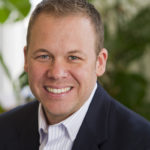 Joel Scott most recently served on faculty at Boston University. His scholarship is anchored in moral development with an eye toward higher education reform. After four years of commuting and 300,000 flyer miles, his family has decided to remain full-time in Waco. Joel is currently re-rooting, looking forward to backyard barbeques, driveway basketball, and living a more integrative life.
Joel Scott most recently served on faculty at Boston University. His scholarship is anchored in moral development with an eye toward higher education reform. After four years of commuting and 300,000 flyer miles, his family has decided to remain full-time in Waco. Joel is currently re-rooting, looking forward to backyard barbeques, driveway basketball, and living a more integrative life.
The Act Locally Waco blog publishes posts with a connection to these aspirations for Waco. If you are interested in writing for the Act Locally Waco Blog, please email [email protected] for more information.
by Kiera Boone
It’s no secret that people are starting to become more health conscious. With all the documentaries on fast food (i.e. SuperSize Me and Forks over Knives) and the BuzzFeed Facebook videos on fried delicacies and bacon covered treats, it’s hard to choose between what TASTES good and what IS good. So, to try to bridge the gap between taste and nutrition, it has become a trend for people to lean toward more organic products. These are products that are grown without the use of pesticides, synthetic fertilizers, sewage sludge, genetically modified organisms, or ionizing radiation. Choosing organic products also means animals that produce meat, poultry, eggs, and dairy products do not take antibiotics or growth hormones. Basically, going “organic” means that people must be more aware of the nutrition labels on products they buy when they go grocery shopping and try to get more fresh products. Although fertilizers, pesticides, and bioengineering can be productive for agricultural yields, the chemicals from those items may not be the best for our bodies in the long-run.
Why should I buy organic products?
Although we may want to eat healthier and choose organic items when grocery shopping sometimes it is not as easy as it seems. For example, organic foods are more expensive in general. Paying an extra dollar or two, may not seem like a big deal to some, but to others, that difference is often avoided. Another reason many people stray from organics is because they don’t know the benefits organic products can have. Why buy organic, when the same fresh product it cheaper and a lot bigger? Well, here are a few reasons why organic products can be worth the extra buck:
Benefit From More Nutrients! – It has been studied and proven that organically grown foods are substantially more nutritious. They contain more nutrients that we need such as vitamins, minerals, enzymes, and micronutrients. Furthermore, studies have also shown that five servings of organically grown vegetables like lettuce, spinach, and carrots have more Vitamin C than the same amount of conventionally grown veggies!
Avoid Harmful Chemicals! – Many conventional fruits and vegetables are grown with the use of lots of fertilizers and pesticides. More than 600 active chemicals are registered for agricultural use in America! The crazy thing about the many chemicals being sprayed on crops is that the Environmental Protection Agency (EPA) allows it. Many of the chemicals in the fertilizers and pesticides are approved by the EPA. Organic foods are free of those chemicals.
Avoid GMOs! – Genetically engineered foods and genetically modified organisms are saturating grocery stores all around us. GMOs, or “genetically modified organisms” are living organisms whose genetic material has been artificially manipulated in a laboratory through genetic engineering. The main problem with GMOs is that genetic engineering can sometimes add carcinogens in some foods. Carcinogens increase the risk for cancers. Buying organic products helps reduce the risk of GMOs.
A Guide to Shopping Organic
The Dirty Dozen
Whenever possible, buy these foods organic to avoid potential high levels of pesticide residue.
|
|
The Clean Fifteen
These are the foods that are okay to buy conventional when necessary because they have low levels of pesticide residue.
|
|
 Kiara Boone is an Atlanta, Georgia, native who is graduating from Baylor University with a Community Health degree. She is currently interning at the Waco McLennan County Public Health District. She enjoys cooking PINTEREST recipes, tough workouts, and writing poetry in her spare time. Contact Info: Kiara Boone, [email protected].
Kiara Boone is an Atlanta, Georgia, native who is graduating from Baylor University with a Community Health degree. She is currently interning at the Waco McLennan County Public Health District. She enjoys cooking PINTEREST recipes, tough workouts, and writing poetry in her spare time. Contact Info: Kiara Boone, [email protected].
The Act Locally Waco blog publishes posts with a connection to these aspirations for Waco. If you are interested in writing for the Act Locally Waco Blog, please email [email protected] for more information.
By George Eichenberg, bass player, Rising Sons
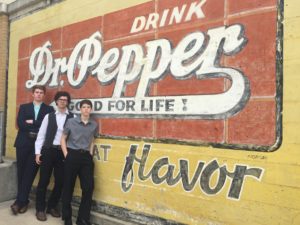 When my friends and I started a band three years ago, I never thought that one day I’d be packing my bags and my bass guitar and going on the road. But five days from now, Spencer Davis, Jackson Anderson and I — otherwise known as the Rising Sons trio — will be heading southeast to play gigs in Louisiana, Mississippi, Alabama and Florida in what we’ve dubbed our 2016 Gulf Coast Tour.
When my friends and I started a band three years ago, I never thought that one day I’d be packing my bags and my bass guitar and going on the road. But five days from now, Spencer Davis, Jackson Anderson and I — otherwise known as the Rising Sons trio — will be heading southeast to play gigs in Louisiana, Mississippi, Alabama and Florida in what we’ve dubbed our 2016 Gulf Coast Tour.
Going on tour sounds pretty cool, but we’re not exactly living the rock-n-roll lifestyle just yet. Our tour bus is a caravan of family cars. We’re not expecting crowds of screaming girls to rush the stage. And our venues don’t seat thousands of people. But that doesn’t make any of this less real or less important to us. We take seriously our job of performing the classic rock, jazz and country tunes that will entertain audiences near, and now, far.
What started out as just messing around on Friday nights has turned into a real paying job with pretty consistent income that has given me the ability to save money, upgrade my equipment and go out with my friends. That wouldn’t be possible without owners of restaurants like the Hippodrome, Manny’s and Jake’s Texas Tea House taking a chance on some teenage boys and their electric instruments — and hiring us again and again once they realize we’re serious about what we do.
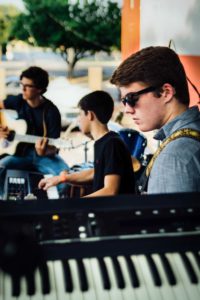 But more importantly, being part of the band — and spending many weekend nights playing music — has given me the opportunity to be part of something. You see, Spencer and Jackson have been playing music all their lives, but I didn’t pick up the bass until 7th grade music class. Outside of school, Jackson practiced with me and I started to understand how the bass adds another layer and gives every song a fuller sound — and how my contributions to the music make us better as a group.
But more importantly, being part of the band — and spending many weekend nights playing music — has given me the opportunity to be part of something. You see, Spencer and Jackson have been playing music all their lives, but I didn’t pick up the bass until 7th grade music class. Outside of school, Jackson practiced with me and I started to understand how the bass adds another layer and gives every song a fuller sound — and how my contributions to the music make us better as a group.
We’ve all worked hard to get here. And though we’ve had lots of help from our parents, we’ve put in a lot of our own sweat. From hours of perfecting every note of our favorite Eagles tune to hauling heavy gear to and from our gigs (now in our own cars — two of us are finally driving!), it’s not easy. We’ve felt everything from love and support to skepticism and doubt. But at the end of the day, when our Algebra teacher and his wife show up to hear us (OK, maybe it was also for the chicken fried steak) at a roadhouse 20 miles outside of town, we know we’re doing something right. When strangers start tapping their feet to the music and singing along, we might be onto something. We’re definitely having fun.
Now we’re taking it on the road. The t-shirts have been printed, the UHaul has been rented and our kick-off party plans have been made. The three of us are looking forward to playing for new audiences and picking up the musical influences of the southern coast. Are we under the illusion that this tour is going to make us famous or that we are going to be discovered? Nah. But as we head out this weekend, we’ll be keeping Waco in the rear view mirror and remembering it’s the good people of our hometown who helped us pave the way.
June 3 – Rising Sons 2016 Gulf Coast Tour Send-Off Party – Join Waco’s favorite teen trio and celebrate their June 4-12 2016 Gulf Coast Tour at this pre-tour performance and party. Cost: Free admission (not including food and drinks at Jake’s). Time: 6 PM – 9 PM. Location: Jake’s Texas Tea House, 613 Austin Ave. For more information please visit the website: www.ehandersonpr.com/rising-sons
 George Eichenberg is the bass player for the Rising Sons, a Texas teen trio that plays everything from the Eagles to John Mayer and lots in between. George is a junior at Vanguard College Preparatory School and when he’s not playing bass, you can probably find him on the court with the varsity basketball team at school. His parents are Alex and Gretchen Eichenberg; and he has a sister, Brigitte, 13, and a big chocolate Lab named Luke.
George Eichenberg is the bass player for the Rising Sons, a Texas teen trio that plays everything from the Eagles to John Mayer and lots in between. George is a junior at Vanguard College Preparatory School and when he’s not playing bass, you can probably find him on the court with the varsity basketball team at school. His parents are Alex and Gretchen Eichenberg; and he has a sister, Brigitte, 13, and a big chocolate Lab named Luke.
The Act Locally Waco blog publishes posts with a connection to these aspirations for Waco. If you are interested in writing for the Act Locally Waco Blog, please email [email protected] for more information.
According to the Project Link website, “Project Link is a new local program that started in Fall 2015 to help Waco-area high school students, currently at La Vega High School and University High School, and their families in charting a more assured and successful post-secondary journey through intense one-on-one college, career, and financial advising… At the high schools, the Project Link team works to create a college-going culture by developing an environment that recognizes the value of higher education, by building awareness of post-secondary resources, and by nurturing student’s individual college and career aspirations.” If you have questions about Project Link, feel free to contact Natalie James at [email protected] or at 254-299-8517. In today’s Act Locally Waco blog post, two Project Link participants share the positive impact this new program is having on their success as first generation college students.
by Carlos Gonzalez and Alexandria Aleman
 My name is Carlos Gonzalez, and I recently completed my second semester at TSTC. When I first got to TSTC, I was lost, but it’s kind of hard to remember now because I now know where everything is located, and one of the Success Coaches helped me with choosing my career path and major. The first semester went well, but my second semester started off a little different, because when I needed more help the Success Coach I was used to seeing no longer worked in that department. However, as luck would have it, I was contacted by Brandon Chappell, the Project Link Outreach Specialist at TSTC. I remember I was expecting someone much older when he contacted me, but luckily it’s easier for me to relate to him because he’s closer to my age. He was offering to help me with some of my college struggles basically anytime I needed him. We’ve talked about my grades, he’s helped me practice for a job interview, and when I noticed at the beginning of the semester I could not afford my textbooks, Brandon helped me to get 3 of my most expensive textbooks for free.
My name is Carlos Gonzalez, and I recently completed my second semester at TSTC. When I first got to TSTC, I was lost, but it’s kind of hard to remember now because I now know where everything is located, and one of the Success Coaches helped me with choosing my career path and major. The first semester went well, but my second semester started off a little different, because when I needed more help the Success Coach I was used to seeing no longer worked in that department. However, as luck would have it, I was contacted by Brandon Chappell, the Project Link Outreach Specialist at TSTC. I remember I was expecting someone much older when he contacted me, but luckily it’s easier for me to relate to him because he’s closer to my age. He was offering to help me with some of my college struggles basically anytime I needed him. We’ve talked about my grades, he’s helped me practice for a job interview, and when I noticed at the beginning of the semester I could not afford my textbooks, Brandon helped me to get 3 of my most expensive textbooks for free.
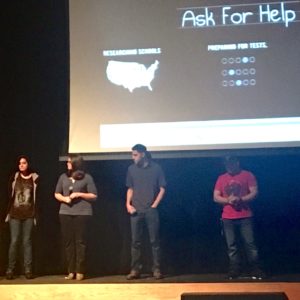 I am a first generation college student, so I was excited to be in college, but I had a lot of questions. Brandon has been there to address a lot of my concerns and given me the opportunity to volunteer on a student panel to speak about my experiences as a first generation college student with some of the Project Link students still in high school. I think Project Link is very helpful. Brandon has been able to help me get a better understanding of the things that happen on campus. To me, Project Link just wants to help the students do their best and succeed in college.
I am a first generation college student, so I was excited to be in college, but I had a lot of questions. Brandon has been there to address a lot of my concerns and given me the opportunity to volunteer on a student panel to speak about my experiences as a first generation college student with some of the Project Link students still in high school. I think Project Link is very helpful. Brandon has been able to help me get a better understanding of the things that happen on campus. To me, Project Link just wants to help the students do their best and succeed in college.
I definitely think Project Link will be beneficial for me in the future to explore different career opportunities as well. I know I can always use Project Link if I have questions about financial aid or any other aspect of college. I appreciate the help I have been getting from Brandon Chappell. He is a very good person to talk to. Even though he can be annoying when he bugs me about my grades, he seems like a fun person to hang out with too.
 My name is Alexandria Aleman. I am a graduate of La Vega High School and have recently completed my second semester at McLennan Community College. Project Link at MCC has been a safety net for me. I try to stay involved with the workshops and events so that it gives me more experience in how college life works. I feel like having this extra help has given me the confidence to keep on track with my career, because it provides me with crucial information about what is happening on campus and how it can benefit us.
My name is Alexandria Aleman. I am a graduate of La Vega High School and have recently completed my second semester at McLennan Community College. Project Link at MCC has been a safety net for me. I try to stay involved with the workshops and events so that it gives me more experience in how college life works. I feel like having this extra help has given me the confidence to keep on track with my career, because it provides me with crucial information about what is happening on campus and how it can benefit us.
As a first-time-in-college and first generation student at McLennan Community College, I have learned a lot about how the real world works, but Project Link has expanded my knowledge further by introducing me to an environment where I do not feel alone or unwelcome. The program has helped me make meaningful connections with other people who are going through the same thing. I’ve been fortunate enough to meet some wonderful peers that are willing to help each other with anything.
I have also experienced a few events where it has helped me build on my public speaking 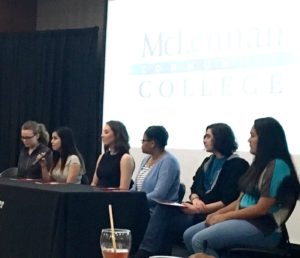 skills. For example, I was part of a student panel that answered questions and shared experiences with other students who will soon be entering the same environment. It helped me practice my public speaking, and I was able to meet some amazing people.
skills. For example, I was part of a student panel that answered questions and shared experiences with other students who will soon be entering the same environment. It helped me practice my public speaking, and I was able to meet some amazing people.
In college, there will be times when you will need help or advice, and Project Link has the right person to help. I have always felt that I can go to her to know what I need to do to get my work done. Whatever I may need she makes sure I get it.
Project Link has provided a lot of workshops that prepare you for anything that comes your way. The workshops range from balancing your finances to taking good notes and have all been very helpful to me. Being in college and having a lot of freedom after high school is amazing but it can be easy to procrastinate and get off track. In the beginning, I felt like I was off track a bit, but with Project Link, I was able to get the help I needed to get back on track.
What has been most helpful is the open, caring and kind Project Link Coordinator, Mrs. James, who makes talking to someone easy. She is there for all her students, and she makes you feel at home. It is like making another friend because talking to her doesn’t feel like speaking to another person in charge. There is truly a family in the making and I hope that one day my sisters can take part of this wonderful program.
Project Link is not just another college readiness program; it is a family — a family that is always there for you with help and things that will benefit you in the long run. I don’t regret being part of this program; I make good use of what is given to me, and that is the knowledge and experience of the real world.
 Carlos Gonzalez is a second-semester student at TSTC. He is a graduate of La Vega High School and is double-majoring in Instrumentation and Electrical Power and Control. After college, he plans on having a good job and being able to help his family financially and possibly exploring other careers.
Carlos Gonzalez is a second-semester student at TSTC. He is a graduate of La Vega High School and is double-majoring in Instrumentation and Electrical Power and Control. After college, he plans on having a good job and being able to help his family financially and possibly exploring other careers.
 Alexandria Aleman is a recent graduate of La Vega High school, and a current college student at McLennan Community College. Alexandria is pursuing her Associates in general academics until she can transfer to Tarleton State University in the Spring of 2016. At Tarleton she plans to earn her Bachelors in Psychology, and then her Masters and PHD at Baylor University. She is attending college to give her parents, sisters and herself a better life.
Alexandria Aleman is a recent graduate of La Vega High school, and a current college student at McLennan Community College. Alexandria is pursuing her Associates in general academics until she can transfer to Tarleton State University in the Spring of 2016. At Tarleton she plans to earn her Bachelors in Psychology, and then her Masters and PHD at Baylor University. She is attending college to give her parents, sisters and herself a better life.
The Act Locally Waco blog publishes posts with a connection to these aspirations for Waco. If you are interested in writing for the Act Locally Waco Blog, please email [email protected] for more information.

